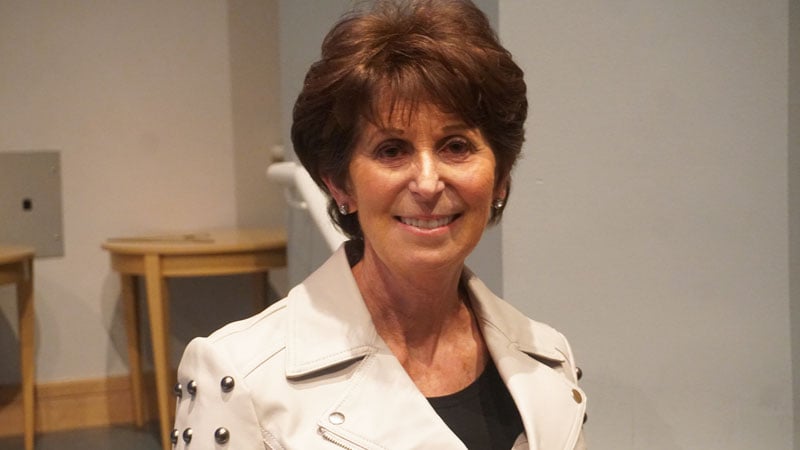Lilly Marks, vice president for Health Affairs at the CU Anschutz Medical Campus, knows career discomfort.
Speaking to an audience of over 200 predominantly early career women at a recent Women in Leadership Power Breakfast, Marks recounted how her successful early career in banking and finance took an abrupt detour into the world of academic medicine. “If your career progression seems stuck, you have to find the courage to pursue new opportunities.”
She added, “You can’t be a hothouse flower who needs the perfect combination of temperature, humidity and nutrients to survive. Opportunities rarely come without environmental challenges. To progress you must be willing to accept some risks and challenges. Discomfort must become part of your comfort zone.”
In addition to her career at CU, Marks has served on numerous boards, including chair of the board of directors of the Association of American Medical Colleges, and the board of the Federal Reserve Bank. She is also a frequent national speaker on medical school economics, healthcare and clinical practice management, leadership, and women’s professional development.
Marks outlined her key career tips for women.
On negotiations:
“The reality is that all of life is a negotiation. Negotiation skills are important for both men and women. Research shows that “women don’t ask”, not only for salary or resources but also for visibility or opportunity.”
Lilly Marks, vice president for Health Affairs at the CU Anschutz Medical Campus
“Over the years, I’ve been involved in many recruitment negotiations. In my experience, women often receive less in their startup packages – not because we deliberately want to give them less, but because they ask for less. Women believe that fairness and equity will prevail, they shouldn’t have to ask and their value and accomplishments will be recognized and rewarded. It doesn’t always work that way.”
On trying something new:
“Remember that you can find ways to apply your talent in unique and unimagined opportunities. If I stayed in banking, I would have looked like every other banker. Being able to creatively adapt and apply my specific skills to a totally different domain became a great differentiator and accelerator, but it required becoming a contextual expert.”
On taking career risks:
“ Women frequently hesitate to pursue career opportunities and leadership positions if they don’t possess ALL of the stated desired qualifications. They worry they will be non-competitive with only 8 or 9 out of 10 qualifications. The reality is that searches rarely produce candidates who can check all the desired boxes. To succeed, you have to be willing to play in traffic. It gets crowded sometimes and you will take some hits, but to succeed, you must get in the game.”
On being taken seriously:
“If you are going to be taken seriously by your colleagues, you have to have more than an opinion. Uninformed assumptions and lack of intellectual rigor won’t get you far.”
On being the most prepared person in the room:
“Do your homework and always come prepared. Early on, even if I wasn’t the smartest person in the room, it became my goal to be the most prepared person in the room and I discovered that quite often that goal was pretty easy to achieve.”
Leadership from the back row:
“Long before you achieve positional power, you can have organizational impact and influence as a thought leader and a leader from the back row. A powerful strategy is to volunteer to “write the first draft”.
‘Always recognize that you don’t know what you don’t know. Be disciplined and deliberate in filling those gaps.’ – Lilly Marks
“Human nature is such that your colleagues may not adopt 100% of what you proposed, but the reality is you will have set much of the framework and boundaries for the options being discussed and you will likely have significant impact on the final product.”
On being curious:
“Being intellectually curious and knowing more about more, even if it is only tangentially connected to what you do, makes you better. It enhances your career and your life. Always recognize that you don’t know what you don’t know. Be disciplined and deliberate in filling those gaps.”
On confrontations:
“If you need to have a hard conversation, take it off the public stage. Avoid public ambushes or ‘gotchas’ that elevate yourself at someone else’s expense. We all know people who deserve it, but after the initial surge, it never works out in the long run. I’ve seen a lot of smart people get in a lot of trouble when they let their ego get in the way of their judgment.”
On women finding their voices:
“No gender owns the monopoly on stupid questions. You have to be willing to raise your hand and speak up. Don’t trivialize the impact of what you’re about to say by prefacing your comments with qualifiers like, ‘I’m not sure about this” or “I may be wrong, but…”. This marginalizes the importance of what you’re about to say. Being informed and prepared gives you the confidence to speak up and be heard.”
The importance of visibility:
“To progress in your career, people need to know who you are and see what you can do. It’s a lot easier than you think to find opportunities for visibility– there’s no secret handshake to get woven into the fabric of your institution. Volunteer to be on a committee, give a presentation or an interview, serve on a board, or write the first draft of a collaborative document. That may mean spending time at events where your presence means less than your absence.”
On work-life balance:
“The goals of achieving a successful career and family are difficult but not mutually exclusive. One practical tip is to buy whatever help you can with the highest priority being really good childcare. After that, consider finding help with other mundane daily chores. It seems really self-indulgent, but you’re not buying a luxury; you’re buying the most precious commodity of all – TIME – to spend with your family or to maintain your resilience.”
Marks concluded by advocating for the power of building a network. “Relationships are often what stand between success and failure. Build networks of colleagues who are more invested in your success than committed to your failure.” She added, “Never forget a favor and never pass up the chance to do a favor that will help someone else.”
Guest contributor: Shawna Matthews, a freelance writer specializing in science and healthcare.




